I first started shopping at Amazon back in the late 90s. I was in the Torrey Honors Institute at Biola University and purchased dozens of classical books every semester. When a professor mentioned I should check out the great prices at this new online bookstore called Amazon, I immediately signed up and started getting the books shipped. (Remember those little Amazon bookmarks they’d include in each shipment? I think I still have one in an old book somewhere…)
Now, Amazon is so much more than an online discount book seller. Pretty much every week my family orders something we need but can’t find in a local store. Just last week I ordered my son some new rain boots:
About a decade ago, I started making one small adjustment to my Amazon shopping in order to benefit nonprofits I support. By going directly to www.Smile.Amazon.com, 0.5% of my purchases were sent to a nonprofit I selected in my account settings. In 2020, Amazon reported that since its inception in 2013, SmileAmazon has donated $365 million to charities.
Many nonprofits ask their supporters to opt in to this program because regular shopping on Amazon can add up to a decent support check for the charity.
While the AmazonSmile checks may not be huge, it’s still a nice bonus that nonprofits didn’t have to actively work for that funding; it was as simple as doing your usual shopping and then designating the charity you want to support.
Last month, Amazon announced it’s ending AmazonSmile because “the program has not grown to create the impact that we had originally hoped.” The announcement goes on to explain that with more than a million eligible charities, “…the ability to have an impact was often spread thin.” From now on, Amazon will choose what charities it wants to support and send them donations directly.
I was disappointed when I received this message from Amazon because I liked the fact that something as easy as my regular shopping on Amazon translated into supporting a charity that I want to support. Then I saw a post on Reddit about the reason AmazonSmile was created and I was further disappointed.
According to a Reddit user who used to work at Amazon’s corporate office, the AmazonSmile program was created not to support charities, but as a way to get customers to go directly to their website instead of using Google to find it, and paying Google for the ad redirect:
“Internally, Amazon thought that if they could force users to go straight to Amazon, offer a small but obviously less amount of money to charity from each customer than would have been paid to Google, it would help kill customers going to Google, save Amazon more money than paying Google, and be good overall for the brand value of Amazon.”
The user goes on to share the real purpose of the program: “AmazonSmile was developed by the Traffic Optimization team, whose entire purpose is increasing efficiency and lowering costs of getting customers to Amazon.”
“Literally everything the company does is about profits, and extended customer lifetime value. Everything. Even the charity programs are just designed to save Amazon money.”
Another former Amazon employee who actually worked on AmazonSmile confirmed the program’s purpose: “The intent of the program was to be cost neutral - the amount Amazon donated to charities was about equal to the costs it saved by not having to pay Google for advertising clicks. Tax write-off was a negligible side benefit, goodwill was just marketing fodder.”
I haven’t verified if these Reddit users are actually who they claim to be, but assuming they are telling the truth, their insights reveal a lot about the culture at Amazon.
Some would argue that this was a genius idea on the part of Amazon. It saved the company money, or at least was cost neutral. It fostered goodwill with customers and charities. As I mentioned, I liked the idea that a portion of my Amazon spending on household items was sent to the charity of my choice.
But upon hearing how the program supposedly came into existence, it felt like Amazon had taken advantage of customers’ desire to be charitable in order to increase their profit. Why not just be honest? Amazon could have incentivized customers in a much more transparent way: “If you come directly to Amazon instead of using Google, we’ll give you a discount.”
Amazon missed a huge opportunity here to establish its purpose both with employees and customers. Instead of creating a program to save money under the guise of supporting charity, it could have literally made supporting charities part of its company purpose.
As John Mackey shares in his book Conscious Leadership, “Nothing motivates people or transforms organizations like the possibility of discovering a higher purpose embedded in the essential work of the enterprise itself.” Mackey notes that conscious leaders focus on both impact and profit. And “the central goal of most businesses is to bring benefits to other people, not simply to make money.”
As you can tell by the tone of the Reddit posts from the former Amazon employees, they don't like how the company duped customers just to increase their profit. If Amazon had stated that part of their purpose was charitable giving, those employees would have felt part of a higher purpose, not just increasing the wealth of Jeff Bezos and Amazon shareholders.
I’ll miss that fact that shopping on Amazon means I can also support causes I care about. It’s fantastic that AmazonSmile has distributed over $300 million in donations over the last decade to the charity each customer chooses to support.
Hopefully the lesson here is that conscious leaders can do good and do well without misleading customers. Companies will boost their brand and impact by being honest, making charity part of their purpose, and inspiring all stakeholders to create win-win-wins for everyone involved.
Work happy. Live happy. BE happy.
Meredith
P.S. Moving forward, you’ll have access to my weekly podcast! Paid subscribers will receive the podcast on Monday and receive exclusive content. Unpaid subscribers will receive the podcast later in the week. So you can listen to this newsletter if you don’t get a chance to read it on Tuesdays. Let me know what you think of the podcast!
The way we work and build teams is rapidly changing. Leaders often feel unprepared to navigate the transition. As a conscious leadership coach, consultant and communicator, Meredith helps leaders and their teams create new ways of working and relating so they can prepare for the future by consciously co-creating it.
Contact her to develop your conscious leadership and transform your organization into the workplace of the future.
You can support my work developing more conscious leadership in the world by investing in a paid subscription to this newsletter. Upgrade your subscription today!
Connect with Meredith on Instagram, Facebook, Twitter, and LinkedIn for content related to these topics.www.MeredithTurney.com




